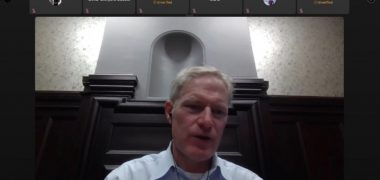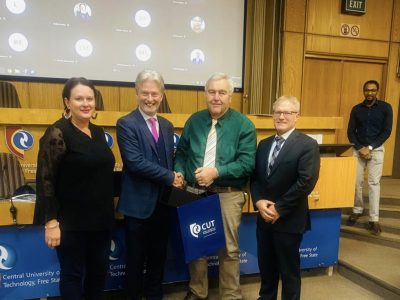
Two Academic Highlights at the Central University of Technology: The 2025 Prestige Research Seminar and the Quantitative Analysis Using R Course
The Central University of Technology, Bloemfontein (CUT) recently hosted two academic events. The Faculty of Management Sciences Prestige Research Seminar and an independent Quantitative Analysis using R course by Prof. Dr. Oliver Serfling of the Rhine-Waal University of Applied Sciences (HSRW) took place consecutively, each contributing uniquely to the growing international partnerships among CUT, HSRW, and Makerere University (MAK) in Uganda.
The 2025 Faculty of Management Sciences Prestige Research Seminar
Held under the theme “Navigating an Uncertain Future: Perspectives from the Management Sciences,” the annual Prestige Research Seminar gathered scholars, students, and practitioners to explore how higher education can navigate global challenges through research and innovation.

At the invitation of CUT’s Faculty of Management Sciences, Prof. Dr. Oliver Serfling from HSRW participated in the event, which featured research presentations by emerging scholars from several departments. Many of these papers examined the difficulties small enterprises and start-ups face amid rapidly changing supply chains in Southern Africa. In his concluding remarks, Prof. Serfling highlighted the dual importance of entrepreneurial innovation and supportive institutional structures, noting that sustainable economic growth depends on enabling small firms to mature and achieve economies of scale.
Complementing these insights, the keynote address by Prof. Philippe Burger, Dean of Economic and Management Sciences at the University of the Free State, called for a new academic ethos built on collaboration rather than competition. He emphasized that adaptability, digital transformation, and responsible use of AI will shape the next generation of management sciences.
Panel discussions and breakout sessions broadened the dialogue to topics such as digital entrepreneurship, public-sector governance, and the ethics of data-driven decision-making. Across all contributions, one message stood out: universities must work together — across disciplines and continents — to create resilient, inclusive systems of higher education.
Representatives from HSRW and MAK joined the seminar, reaffirming the partners’ shared commitment to international collaboration and knowledge exchange, with support from the German Academic Exchange Service (DAAD).
Quantitative Analysis Using R – with Applications in Business and Social Sciences
Following the seminar, CUT hosted an independent hybrid course facilitated by Prof. Dr. Oliver Serfling, an expert in quantitative methods from HSRW.
While separate from the Prestige Research Seminar, the course complemented CUT’s broader mission to enhance research capacity through practical training and international collaboration. The course, titled “Quantitative Analysis using R – with Applications in Business and Social Sciences,” provided hands-on instruction in modern data analytics techniques. Participants from South Africa, Germany, and Uganda worked collaboratively — some on-site in Bloemfontein and others joining virtually — to explore the R programming environment, data visualization, and regression modeling.

Prof. Serfling emphasized that data literacy is a universal skill, essential not only for researchers but also for decision-makers across industries. The interactive sessions encouraged participants to connect theoretical understanding with real-world data challenges, promoting both technical competence and critical thinking. The hybrid format underscored how technology enables global education without borders. For many attendees, the course was their first experience with collaborative quantitative research across countries and disciplines. The result was a learning environment that fostered problem-solving, innovation, and the exchange of diverse perspectives.
Collaboration as the core Vision
Both the Prestige Research Seminar and the R course reflected a shared commitment among the partner universities to build an academic ecosystem where research, teaching, and technology act as bridges between nations. These initiatives illustrated that while academic disciplines may differ in method and focus, the collective pursuit of knowledge continues to unite scholars across continents. By combining strategic dialogue with hands-on learning, HSRW, CUT, and MAK are shaping a collaborative model for higher education — one where ideas travel freely, technology strengthens connection, and research delivers global impact.
💡Together, the partner institutions extend their sincere appreciation to the German Academic Exchange Service (DAAD) for its ongoing support in fostering international collaboration and academic exchange.As both events demonstrated, meaningful cooperation is not a future aspiration — it is already a shared reality.
Group Photo © Central University of Technology, Free State
Sustainable Food Systems Research Centre
Marie-Curie-Straße 1
47533 Kleve
Deutschland/Germany

